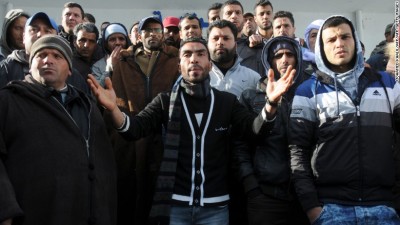
Tunisian authorities on Thursday lifted an expansive curfew “following the improvement of the security situation,” the Interior Ministry said — a sign of progress but hardly a guarantee that popular unrest over the North African nation’s struggling economy is over.
The decision affects “the whole territory,” according to the ministry’s Facebook page.
On January 22, officials implemented the nationwide curfew to counter large-scale demonstrations over a lack of jobs and abundance of poverty. The Interior Ministry explained then that the move, prohibiting people from being out between 8 p.m. and 5 a.m., was to to protect public and private property from attack.
Protests about scarce jobs and an ineffective government also drove similar unrest five years ago and spurred authoritarian President Zine el Abedine Ben Ali to flee in January 2011 — making Tunisia the first of what would become several nations in the Arabic-speaking region in North Africa and the Middle East where popular uprisings led to the ouster of longtime leaders.
Turmoil followed in other countries such as Libya and Egypt that were also caught up in what was called the Arab Spring, while protests in Syria spiraled into a bloody civil war that still rages today.
Tunisia, though, had long been hailed as the exception. Its “Jasmine Revolution” was marked by a relatively peaceful political transition and inclusive government.
But that doesn’t mean Tunisia has been without problems. Terrorists, some of them from ISIS, have waged brutal attacks on the country in recent years, including on Tunis’ Bardo museum and a seaside resort in Sousse.
Those acts have hurt Tunisia’s economy by deterring tourists from visiting. That’s one of several reasons that the country, overall, has struggled to generate enough good jobs to satisfy its citizens.
President Beji Caid Essebsi has called the protests focused on these problems legitimate, while claiming that his government inherited high unemployment and high poverty that can’t be fixed overnight.
According to a story posted Thursday by Tunisia’s official TAP news agency, Essebsi said officials should focus on passing legislation to bolster the country rather than stir up protests that won’t help the socio-economic situation.
“We came up with an economic reconciliation bill but the Popular Front voiced disapproval and called for taking to the streets in defiance of constitutional institutions,” the President said.
END

Be the first to comment